I want to assign the value returned from the sp_formCreateEventID stored procedure into a new variable (@eventId). I initially thought this was the way to go. This solution is also in line with the EXEC command generated by SSMS.
However, for some reason the EXEC line returns an INT from the stored procedure as expected, but when it cant' assigned it's value to the @eventId variable.
DECLARE @eventId INT
EXEC @eventId = sp_formCreateEventID @patientId, @programId, @clinicianId, @formId, @phaseTypeId, @draft, @dataCollectionDate, NULL
SELECT @eventId
sp_formCreateEventID (don't hate me, I didn't write this...):
ALTER PROCEDURE [dbo].[sp_formCreateEventID]
@PatientID int,
@ProgramID int,
@ClinicianID int,
@FormID int,
@PhaseTypeID int,
@Draft varchar(5),
@CompletedDate varchar(40),
@UserID int = null
AS
BEGIN
IF @CompletedDate = ''
SET @CompletedDate = NULL
--for some forms such as Clinical Input - Initial, there should only have one form filled for a youth. If that is the case and the event has existed, just return that one.
DECLARE @EID int
SET @EID = dbo.fn_GetExistingOnlyOneEventID(@PatientID, @ProgramID, @FormID)
PRINT @eid
IF @EID <> -99
BEGIN
SELECT
@EID AS 'EventID'
RETURN
END
DECLARE @TxCycleID int
DECLARE @TxCyclePhaseTypeID int
DECLARE @TxCyclePhaseID int
DECLARE @seqNum int
DECLARE @NewEventID INT
--if there is no cycle for this patient for this program, then create one.
IF NOT EXISTS (SELECT * FROM TxCycle WHERE PatientID = @PatientID AND ProgID = @ProgramID)
BEGIN
INSERT INTO TxCycle
(OpenDate, PatientID, ProgID)
VALUES
(GETDate(), @PatientID, @ProgramID)
END
SELECT
@TxCycleID = Max(TxCycleID)
FROM TxCycle
WHERE
PatientID = @PatientID AND
ProgID = @ProgramID
--In this cycle, for the current phase type, get the max seq number
IF EXISTS (SELECT * FROM TxCyclePhase WHERE TxCycle = @TxCycleID)
BEGIN
SELECT
@seqNum = MAX(SeqNum)
FROM
TxCyclePhase
WHERE
TxCycle = @TxCycleID
SET @seqNum = @seqNum + 1
END
ELSE
BEGIN
SET @seqNum = 1
END
PRINT 'New Seq Num: ' + CONVERT(Varchar(5),@seqNum)
--greate a new seq number under the same phase
INSERT INTO TxCyclePhase
(Type, seqNum, TxCycle)
VALUES
(@PhaseTypeID, @seqNum, @TxCycleID)
--get the new ID, this will be used for the Event
SELECT
@TxCyclePhaseID = Max(TxCyclePhaseID)
FROM
TxCyclePhase
DECLARE @isFinal int
IF @Draft = 'Yes'
BEGIN
SET @isFinal = 0
END
ELSE
BEGIN
SET @isFinal = 1
END
IF EXISTS(SELECT * FROM LoginPassword WHERE ClinID = @ClinicianID AND AccessID IN (1,3))
BEGIN
IF NOT EXISTS (SELECT * FROM ClinPat WHERE ClinID = @ClinicianID AND PatientID = @PatientID)
BEGIN
INSERT INTO
ClinPat
(ClinID, PatientID)
VALUES
(@ClinicianID, @PatientID)
END
END
INSERT INTO FormPat
(PatientID, ClinID, FormID, TxCyclePhase, Date, Final, DataCollectionDate)
VALUES
(@PatientID, @ClinicianID, @FormID, @TxCyclePhaseID, GETDATE(), @isFinal, @CompletedDate)
SELECT @NewEventID = Scope_Identity()
SELECT @NewEventID AS 'EventID'
What am I doing wrong?
